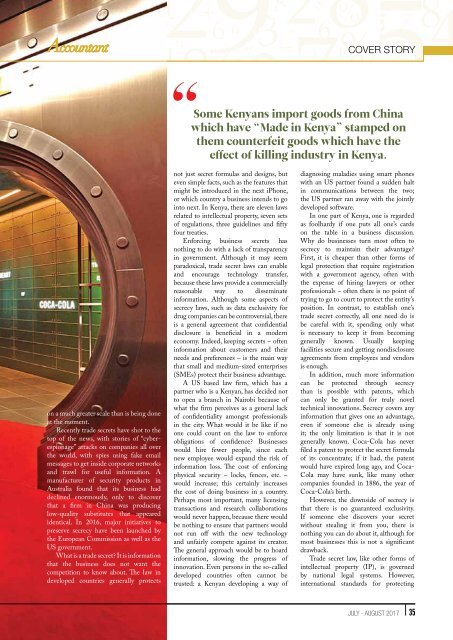The-Accountant-Jul-Aug-2017
Create successful ePaper yourself
Turn your PDF publications into a flip-book with our unique Google optimized e-Paper software.
COVER STORY<br />
Some Kenyans import goods from China<br />
which have “Made in Kenya” stamped on<br />
them counterfeit goods which have the<br />
effect of killing industry in Kenya.<br />
on a much greater scale than is being done<br />
at the moment.<br />
Recently trade secrets have shot to the<br />
top of the news, with stories of “cyberespionage”<br />
attacks on companies all over<br />
the world, with spies using fake email<br />
messages to get inside corporate networks<br />
and trawl for useful information. A<br />
manufacturer of security products in<br />
Australia found that its business had<br />
declined enormously, only to discover<br />
that a firm in China was producing<br />
low-quality substitutes that appeared<br />
identical. In 2016, major initiatives to<br />
preserve secrecy have been launched by<br />
the European Commission as well as the<br />
US government.<br />
What is a trade secret? It is information<br />
that the business does not want the<br />
competition to know about. <strong>The</strong> law in<br />
developed countries generally protects<br />
not just secret formulas and designs, but<br />
even simple facts, such as the features that<br />
might be introduced in the next iPhone,<br />
or which country a business intends to go<br />
into next. In Kenya, there are eleven laws<br />
related to intellectual property, seven sets<br />
of regulations, three guidelines and fifty<br />
four treaties.<br />
Enforcing business secrets has<br />
nothing to do with a lack of transparency<br />
in government. Although it may seem<br />
paradoxical, trade secret laws can enable<br />
and encourage technology transfer,<br />
because these laws provide a commercially<br />
reasonable way to disseminate<br />
information. Although some aspects of<br />
secrecy laws, such as data exclusivity for<br />
drug companies can be controversial, there<br />
is a general agreement that confidential<br />
disclosure is beneficial in a modern<br />
economy. Indeed, keeping secrets – often<br />
information about customers and their<br />
needs and preferences – is the main way<br />
that small and medium-sized enterprises<br />
(SMEs) protect their business advantage.<br />
A US based law firm, which has a<br />
partner who is a Kenyan, has decided not<br />
to open a branch in Nairobi because of<br />
what the firm perceives as a general lack<br />
of confidentiality amongst professionals<br />
in the city. What would it be like if no<br />
one could count on the law to enforce<br />
obligations of confidence? Businesses<br />
would hire fewer people, since each<br />
new employee would expand the risk of<br />
information loss. <strong>The</strong> cost of enforcing<br />
physical security – locks, fences, etc. –<br />
would increase; this certainly increases<br />
the cost of doing business in a country.<br />
Perhaps most important, many licensing<br />
transactions and research collaborations<br />
would never happen, because there would<br />
be nothing to ensure that partners would<br />
not run off with the new technology<br />
and unfairly compete against its creator.<br />
<strong>The</strong> general approach would be to hoard<br />
information, slowing the progress of<br />
innovation. Even persons in the so-called<br />
developed countries often cannot be<br />
trusted: a Kenyan developing a way of<br />
diagnosing maladies using smart phones<br />
with an US partner found a sudden halt<br />
in communications between the two;<br />
the US partner ran away with the jointly<br />
developed software.<br />
In one part of Kenya, one is regarded<br />
as foolhardy if one puts all one’s cards<br />
on the table in a business discussion.<br />
Why do businesses turn most often to<br />
secrecy to maintain their advantage?<br />
First, it is cheaper than other forms of<br />
legal protection that require registration<br />
with a government agency, often with<br />
the expense of hiring lawyers or other<br />
professionals – often there is no point of<br />
trying to go to court to protect the entity’s<br />
position. In contrast, to establish one’s<br />
trade secret correctly, all one need do is<br />
be careful with it, spending only what<br />
is necessary to keep it from becoming<br />
generally known. Usually keeping<br />
facilities secure and getting nondisclosure<br />
agreements from employees and vendors<br />
is enough.<br />
In addition, much more information<br />
can be protected through secrecy<br />
than is possible with patents, which<br />
can only be granted for truly novel<br />
technical innovations. Secrecy covers any<br />
information that gives one an advantage,<br />
even if someone else is already using<br />
it; the only limitation is that it is not<br />
generally known. Coca-Cola has never<br />
filed a patent to protect the secret formula<br />
of its concentrate; if it had, the patent<br />
would have expired long ago, and Coca-<br />
Cola may have sunk, like many other<br />
companies founded in 1886, the year of<br />
Coca-Cola’s birth.<br />
However, the downside of secrecy is<br />
that there is no guaranteed exclusivity.<br />
If someone else discovers your secret<br />
without stealing it from you, there is<br />
nothing you can do about it, although for<br />
most businesses this is not a significant<br />
drawback.<br />
Trade secret law, like other forms of<br />
intellectual property (IP), is governed<br />
by national legal systems. However,<br />
international standards for protecting<br />
JULY - AUGUST <strong>2017</strong> 35

















